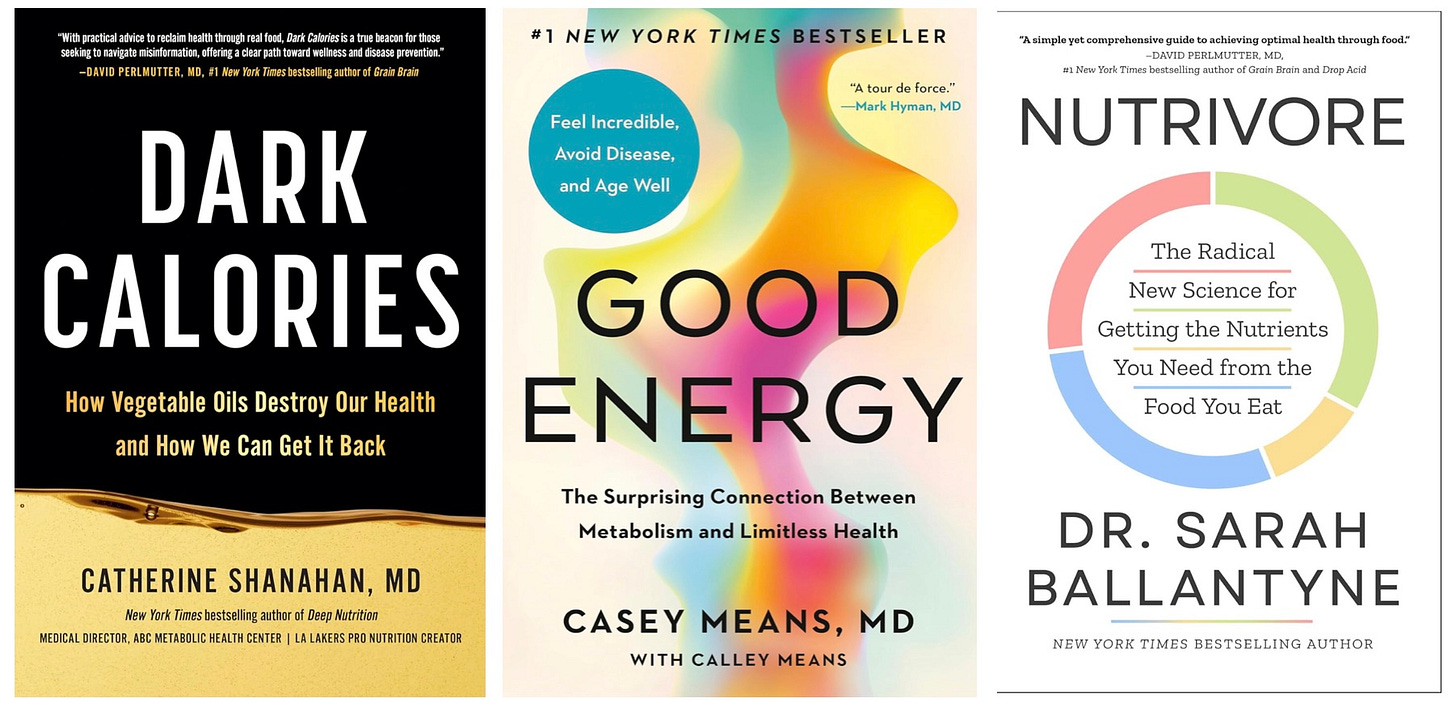Notes on the Seed Oils/Vegetable Oils Debate
French Fries Worse Than Cigarettes, and Clothes Catch on Fire
Recent articles:
• Are Seed Oils Actually Bad for You? Robert F. Kennedy Jr. and others claim they’re harming our health, but the evidence suggests otherwise, New York Times, Nov. 9, 2024)
• America Stopped Cooking With Tallow for a Reason: Robert F. Kennedy Jr.’s view on fats is about bucking convention, not promoting health, The Atlantic, Dec. 2, 2024)
• The pros and cons of seed oils, and how to incorporate them in your diet, Mayo Clinic, July 9, 2924)
• There's no reason to avoid seed oils and plenty of reasons to eat them, Heart.org, August 20, 2024)
• Scientists debunk claims of seed oil health risks , Harvard T.H. Chan School of Public Health, June 22, 2024)
The negative seed oil hype is all wrong, experts say — the problem is American ‘overconsumption’ New York Post, Nov. 16, 2024) (Fun alliteration! But the canola and corn contrarians, the peanut pooh-poohers, the soybean and sunflower disparagers, and even the grapeseed gloom-and-doomers — they’re missing the point, experts say.)
• Myth: Vegetable Oils Are Bad for You, Nutrivore.com. Detailed overview of claims.
• Seed oil Toxicity: Trend or Truth?, DrCate.com, May 25, 2024. (Author of Deep Nutrition and Dark Calories, Dr. Catherine Shanahan coined the seed oil phrase: the hateful eight (Corn, Canola, Cottonseed, Soy, Sunflower, Safflower, Rice bran and Grape seed)
• Seed Oils: Are They Actually Toxic? Cleveland Clinic, October 4, 2023) (“mostly yes”)
• How seed oils took over our diet and what it means for our health (Nina Teicholz, Washington Examiner, December 12, 2024)
• Seed Oils: Sinister or Overhyped?, Nicholas’s (Norwitz) Substack, December 11, 2024)
• French Fries are the Least Healthy Fast Food, But Not Tallow Fries, DrCate, July 31, 2022.
• RFK Jr.’s Food Fight: Can He Change America’s Diet?, Epoch Health, December 10, 2024)
The heat of battle over industrial seed oils…
Critics say seed oil are inflammable. McDonalds, under pressure, switched from cooking french fries in beef tallow to using seed (vegetable) oils. Then, Malcolm Gladwell reports: french fries lost magic flavor and fast food worker clothes, on way to laundry, started catching on fire (see: Malcolm Gladwell Takes Surprising Stance Against McDonald’s Beloved French Fries, GrubStreet, August 11, 2017, and Revisionist History podcast).
Seed oil residues are difficult to clean off walls as well as clothes. News reports of McDonalds’ cleaning cloths bursting into flames: Cleaning cloths spontaneously catch on fire at McDonald's, KXXV story, Jan. 26, 2018). What’s going on?
Seed oils are high in polyunsaturated fats, which are naturally more susceptible to oxidation. Seed oils can undergo oxidative damage when exposed to heat, light, and air during cooking, producing free radicals. These free radicals can cause oxidative stress within the body, triggering inflammation and cellular damage. (The Surprising Connection Between Seed Oils and Inflammation, Elissa Goodman, Lynne Cohen Foundation)
Seed oils react with oxygen (oxidize) and burn (inflame) us inside, say critics. In bottles or in our bodies seed oil double bonds (PU (polyunsaturated) FAs (fatty acids)) react with oxygen, causing inflammation, if not actual fire. Oxidation and oxidative stress cause health problems by generating free radicals, these radicalized oxygen molecules cause cellular damage when reacting with other molecules. Seed oil created oxygen radicals are:
A type of unstable molecule that contains oxygen and that easily reacts with other molecules in a cell. A build up of oxygen radicals in cells may cause damage to DNA, RNA, and proteins, and may cause cell death. An oxygen radical is a free radical. Also called reactive oxygen species. (“oxygen radical,” National Cancer Institute)
So better with tallow: French Fries are the Least Healthy Fast Food, But Not Tallow Fries
Trade offs between seed oils (PUFAs) and saturated fats (SAs):
Seed oil advocates (vegetable oil advocates) argue that PUFAs (Polyunsaturated Fatty Acids) are a healthy alternative to saturate fats. Saturated fats like lard, beef tallow, butter, ghee, and others are traditional cooking oils.
But the debate continues. A google search for “saturated cooking oils” brings up first a (not sponsored) post “Heathy Cooking Oils” post from the American Heart Association (www.heart.org), which begins:
Replacing “bad” fats (saturated and trans) with “good” fats (monounsaturated and polyunsaturated) is smart for your heart.
An easy way to do this is to choose nontropical vegetable oils to cook and prepare food. These types of oils are healthier choices than solid fats, which include butter, shortening, lard and stick margarine, and tropical oils, which include palm and coconut oil. Both solid fats and tropical oils have more saturated fat than nontropical liquid fats.
When shopping for healthy oils, choose those with less than 4 grams of saturated fat per tablespoon, and no partially hydrogenated oils or trans fats.
Here are some common cooking oils that contain more of the “better-for-you” fats and less saturated fat:
Canola
Corn
Olive
Peanut
Safflower
Soybean
Sunflower
Vegetable
It’s a big fat mess! (or Surprise) But what kind of fat mess, saturated or polyunsaturated?



